Home » Would Treating Kids With ADHD Help Their Mothers?
Would Treating Kids With ADHD Help Their Mothers?
March 13, 2019
From The Carlat Child Psychiatry Report
Pavan Madan, MD.
Dr. Madan has disclosed that he has no relevant financial or other interests in any commercial companies pertaining to this educational activity.
Review of: Gokcen C et al, J Child Adolesc Psychopharm 2018;28(5):350–353
Parenting a child with ADHD can be challenging. Parents often report feeling stressed, burned out, or depressed while caring for their children with ADHD. When ADHD medications lead to significant improvements in a child’s behavior, can that alleviate symptoms in parents? A recently published study tried to examine that.
Investigators enrolled 40 children between the ages of 4 and 10 years with ADHD at an outpatient clinic in Turkey. Twenty-one children completed the 8-week study and were prescribed methylphenidate (15), atomoxetine (3), or, surprisingly, risperidone (3). Researchers assessed the kids with a parent rating scale based on the DSM-IV criteria for ADHD, oppositional defiant disorder (ODD), and conduct disorder (CD) (Turgay-DSM-IV-S). They simultaneously assessed the kids’ mothers for depression and burnout symptoms using Beck’s Depression Inventory and the Maslach Burnout Inventory.
At the follow-up visit, the researchers found that children showed improvement in their scores of inattention (14.8±6.9 vs 11±8), hyperactivity (18±6.5 vs 10.5±8), ODD (11.6±6.4 vs 7.6±6.3), and CD (4.9±6.2 vs 2±3.7) symptoms. Moreover, their mothers also showed improvement in depression (14.5±7.7 vs 10.4±6.5) and burnout (18.3±10.6 vs 13±9.5). Interestingly, the improvement in mothers’ burnout symptoms correlated with kids’ ODD and CD symptoms (r = 0.5 and p = 0.02 for both), and improvement in mothers’ depression symptoms correlated with CD symptoms in kids (r = 0.47, p = 0.03). Changes in mothers’ symptoms did not correlate with the changes in children’s inattention and hyperactivity symptoms.
CCPR’S TAKE
This study suggests that improvement in ODD and CD symptoms in children with ADHD is associated with a decrease in burnout and depression symptoms in mothers. However, the findings of this study are difficult to generalize due to small sample size (40), high dropout rate (47.5%), lack of a control group, and an unclear separation between the pre-treatment and post-treatment scores. Furthermore, the authors did not disclose the rationale or dosage for the medications selected; they also did not disclose the psychiatric treatment status of the mothers. When evaluating a child for ADHD symptoms, comorbid disorders like ODD and CD must be assessed and addressed appropriately. Treatment of children with ADHD can lead to healthier interactions at home and school.
Child PsychiatryParenting a child with ADHD can be challenging. Parents often report feeling stressed, burned out, or depressed while caring for their children with ADHD. When ADHD medications lead to significant improvements in a child’s behavior, can that alleviate symptoms in parents? A recently published study tried to examine that.
Investigators enrolled 40 children between the ages of 4 and 10 years with ADHD at an outpatient clinic in Turkey. Twenty-one children completed the 8-week study and were prescribed methylphenidate (15), atomoxetine (3), or, surprisingly, risperidone (3). Researchers assessed the kids with a parent rating scale based on the DSM-IV criteria for ADHD, oppositional defiant disorder (ODD), and conduct disorder (CD) (Turgay-DSM-IV-S). They simultaneously assessed the kids’ mothers for depression and burnout symptoms using Beck’s Depression Inventory and the Maslach Burnout Inventory.
At the follow-up visit, the researchers found that children showed improvement in their scores of inattention (14.8±6.9 vs 11±8), hyperactivity (18±6.5 vs 10.5±8), ODD (11.6±6.4 vs 7.6±6.3), and CD (4.9±6.2 vs 2±3.7) symptoms. Moreover, their mothers also showed improvement in depression (14.5±7.7 vs 10.4±6.5) and burnout (18.3±10.6 vs 13±9.5). Interestingly, the improvement in mothers’ burnout symptoms correlated with kids’ ODD and CD symptoms (r = 0.5 and p = 0.02 for both), and improvement in mothers’ depression symptoms correlated with CD symptoms in kids (r = 0.47, p = 0.03). Changes in mothers’ symptoms did not correlate with the changes in children’s inattention and hyperactivity symptoms.
CCPR’S TAKE
This study suggests that improvement in ODD and CD symptoms in children with ADHD is associated with a decrease in burnout and depression symptoms in mothers. However, the findings of this study are difficult to generalize due to small sample size (40), high dropout rate (47.5%), lack of a control group, and an unclear separation between the pre-treatment and post-treatment scores. Furthermore, the authors did not disclose the rationale or dosage for the medications selected; they also did not disclose the psychiatric treatment status of the mothers. When evaluating a child for ADHD symptoms, comorbid disorders like ODD and CD must be assessed and addressed appropriately. Treatment of children with ADHD can lead to healthier interactions at home and school.
Issue Date: March 13, 2019
Table Of Contents
Recommended
Newsletters
Please see our Terms and Conditions, Privacy Policy, Subscription Agreement, Use of Cookies, and Hardware/Software Requirements to view our website.
© 2025 Carlat Publishing, LLC and Affiliates, All Rights Reserved.


_-The-Breakthrough-Antipsychotic-That-Could-Change-Everything.webp?t=1729528747)



